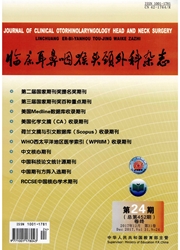

 中文摘要:
中文摘要:
目的:评价语后聋成年人工耳蜗使用者感受音乐中情感的能力。方法:使用慕尼黑音乐经验问卷(MUMU)评价12例听力正常受试者与12例人工耳蜗受试者音乐经验的匹配程度,以及他们聆听音乐的动机。使用人工耳蜗音乐评估软件(MuSIC)中的情感分级测试,评价人工耳蜗使用者感受音乐中情感的能力。选取软件库中15条测试曲目,受试者聆听每条曲目后,根据自己的感受进行情感分级。结果:与听力正常受试者相比,12例人工耳蜗受试者由于情感需要而去聆听音乐的动机明显降低,他们对悲伤或欢快乐曲的感受与听力正常受试者基本一致,但存在个体差异大的特点。结论:语后聋成年人工耳蜗使用者感受音乐中情感的能力与听力正常受试者相近,但他们由于情感需要而去聆听音乐的动机明显差于听力正常受试者。
 英文摘要:
英文摘要:
Objective:To assess the emotional response to music by postlingually-deafened adult cochlear implant users. Method: Munich music questionnaire(MUMU) was used to match the music experience and the motivation of use of music between 12 normal-hearing and 12 cochlear implant subjects. Emotion rating test in Musical Sounds in Cochlear Implants(MuSIC) test battery was used to assess the emotion perception ability for both normal-hearing and cochlear implant subjects. A total of 15 pieces of music prases were used. Responses were given by selecting the rating scales from 1 to 10. "1" represents "very sad" feeling, and "10" represents "very happy" feeling. Result: In comparison with normal-hearing subjects, 12 cochlear implant subjects made less active use of music for emotional purpose. The emotion ratings for cochlear implant subjects were similar to normal-hearing subjects, but with large variability. Conclusion: Post-lingually deafened cochlear implant subjects on average performed similarly in emotion rating tasks relative to normal-hearing subjects, but their active use of music for emotional purpose was obviously less than normal-hearing subjects.
 同期刊论文项目
同期刊论文项目
 同项目期刊论文
同项目期刊论文
 Relative Contributions of Temporal Envelope and Fine Structure Cues to Lexical Tone Recognition in H
Relative Contributions of Temporal Envelope and Fine Structure Cues to Lexical Tone Recognition in H Effects of temporal fine structure stimulation on Mandarin speech recognition in cochlear implant us
Effects of temporal fine structure stimulation on Mandarin speech recognition in cochlear implant us 期刊信息
期刊信息
